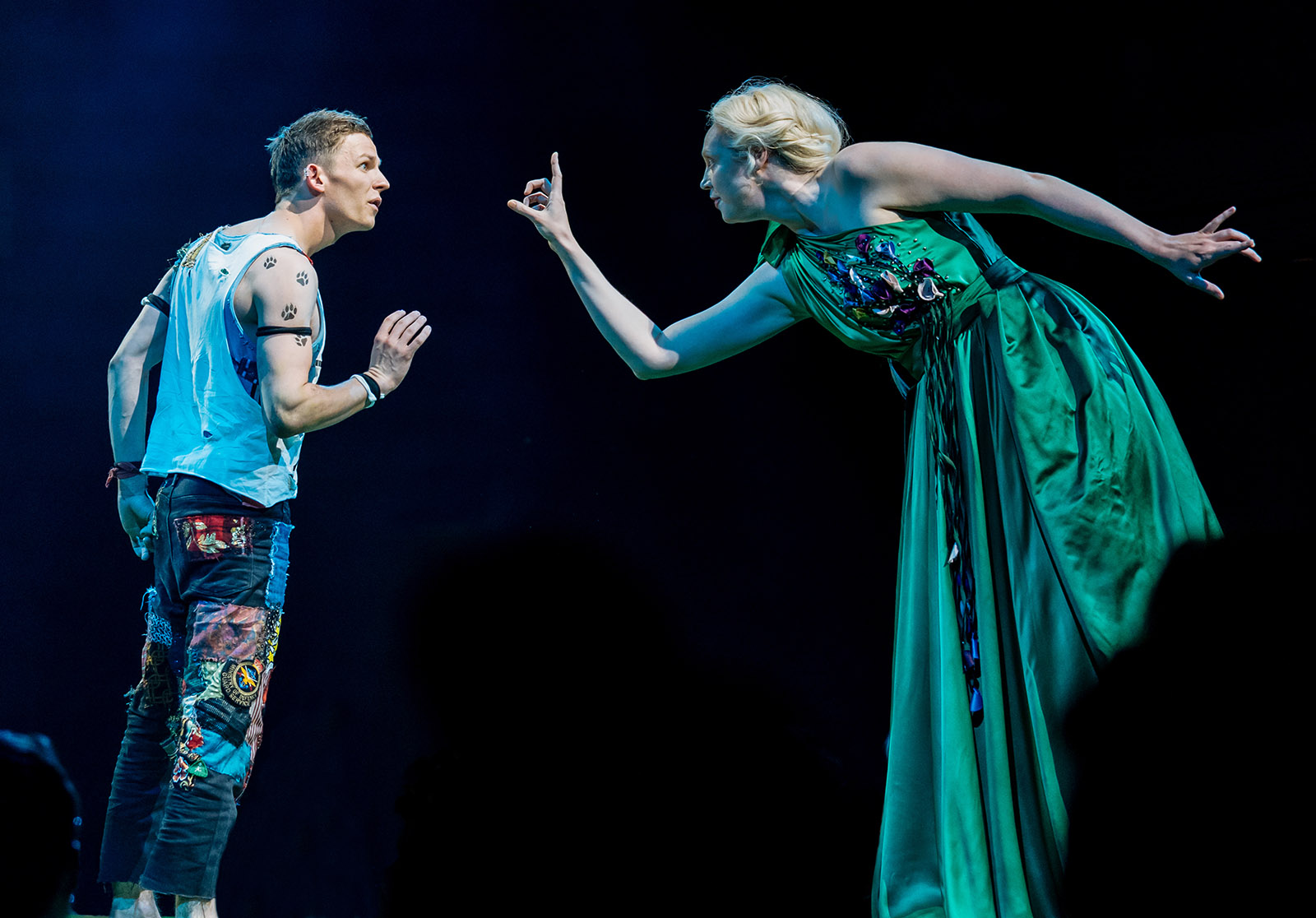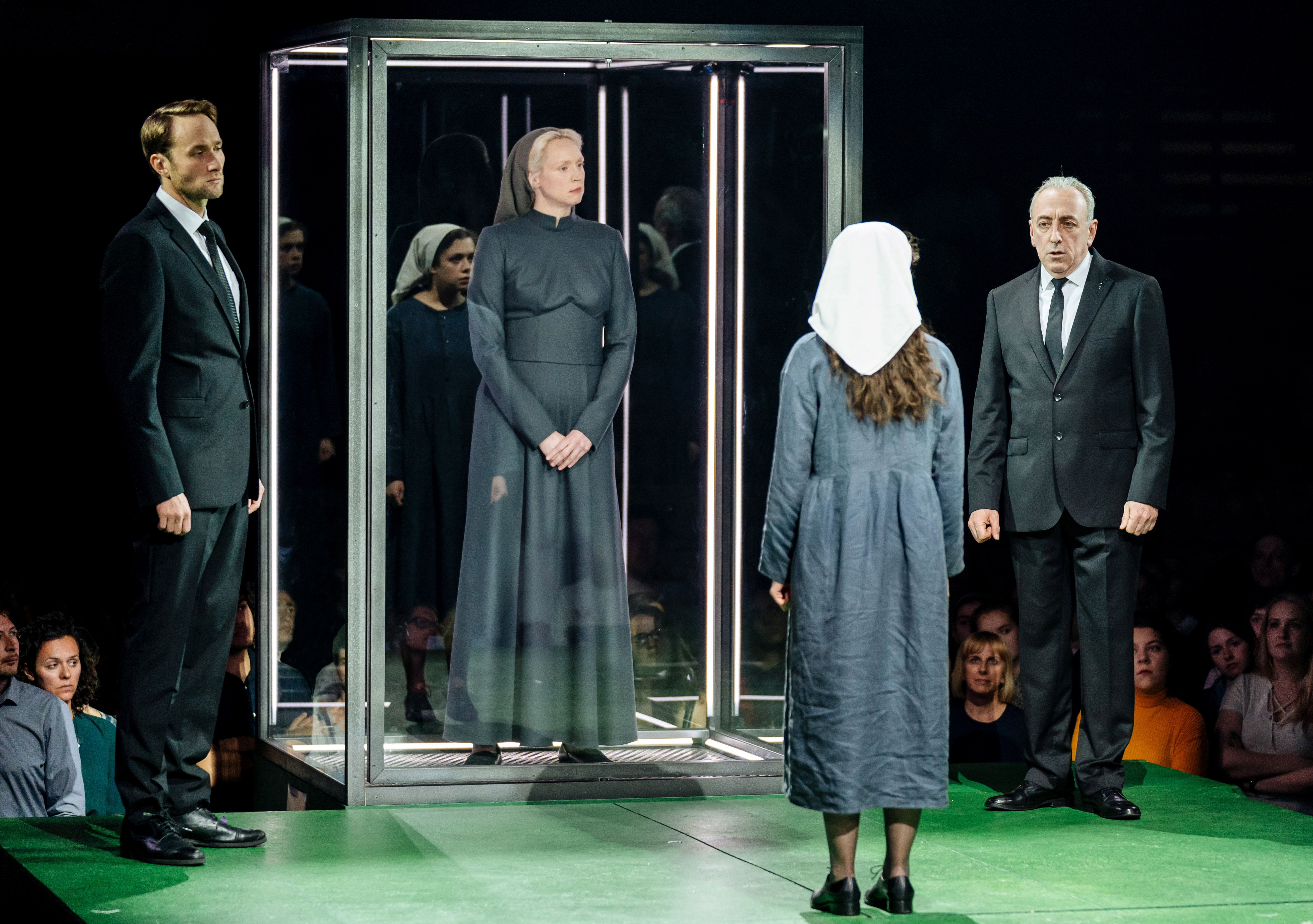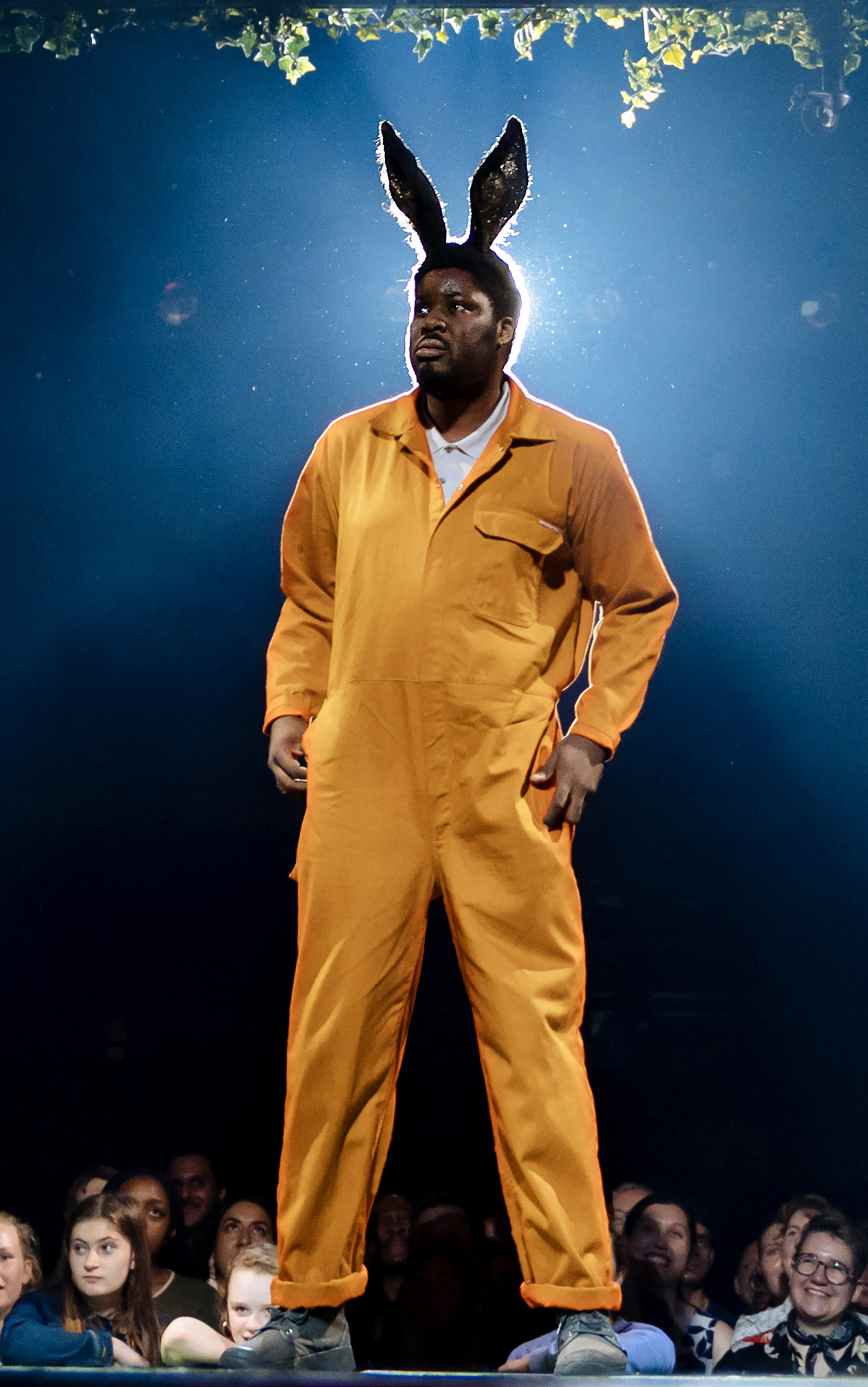Next summer will mark the fiftieth anniversary of Peter Brook’s production of A Midsummer Night’s Dream at the Royal Shakespeare Company. Epithets like “landmark” or, worse, “seminal” have a tendency to attach themselves to mentions of Brook’s production—in fact, it was irreverent, playful, delightfully topsy-turvy (the fairies spent most of their time hanging upside down on trapeze swings). The writer and critic Donald Richie, who had worked closely with Brook, described the production as a parable of maturation, sexual and social. Overseeing it all, actor Alan Howard’s Theseus doubled in the role of Oberon, guru-cum-ringmaster, guiding his subjects through the adventure-playground of puberty and safely into adulthood.
Nearly a half-century later, Brook’s Dream still hangs heavy over British theatre. Nicholas Hytner, who ran London’s state-subsidized National Theatre for twelve years until 2015 and is now the impresario of the Bridge Theatre, his own commercial theater complex opposite the Tower of London, has chosen to tackle Brook’s legacy head on. His new production of A Midsummer Night’s Dream is both homage and exorcism. Fairyland is again full of aerial artistes, but here they tumble down white bedsheets into a black box of a stage, inverting Brook’s famous white space. The Athens woodland is once more a dreamscape where Theseus’s and Hippolyta’s suppressed fantasies can fly free—but this being 2019, it is Hippolyta/Titania who takes command. Hytner’s production clearly sets out to queer Brook’s heterosexual tradition. Disappointingly, however, it relies on the oldest of regressive sexual tropes to get there.
First things first: this Dream is still an off-West End production and so it lives and dies by the box-office pull of its star lead: Gwendoline Christie, Game of Thrones’s Brienne of Tarth, is the big name and, as Hippolyta/Titania, this is her show. In case we weren’t sure we’d get our star-spotting money’s worth in the opening minutes, Hytner frames Christie in a translucent glass cage at the center of the stage pit for twenty minutes while the promenading audience files in around her. One is reminded of a crowded aquarium.
Post-feminist productions of Dream tend to emphasize the nonconsensual nature of Hippolyta’s marriage to Theseus, and, not to be outdone, Hytner goes full Handmaid’s Tale. This Athens is a puritanical and patriarchal cult, with Hermia and the caged Hippolyta wearing uniform headscarves, while Oliver Chris, recently Prince William in Mike Bartlett’s Broadway hit King Charles III, stalks around giving his best Commander Waterford impression. (Hermia, finally resolving to flee the city, rips her hair free as if renouncing an enforced hijab.) But Hippolyta has her revenge in the forest, where she keeps Titania’s name but steals almost all of Oberon’s lines and action from Shakespeare’s texts. It is Titania who makes merry with David Moorst’s Puck, while Oberon is tricked into bedding Bottom (Hammed Animashaun), finally unleashing his wildest sexual desires.
Hence the progressive’s problem. Hytner—who does happen to be gay—clearly presents his Dream as a joyful celebration of queer liberation. Lest we miss the message, an enormous rainbow Pride flag flutters over the audience during the finale’s mass dance party. The female lovers and the male lovers all get their chances at a same-sex clinch. But the heart of Hippolyta’s revenge on Theseus, the man who leers his rape threats at her while she stands caged, is to humiliate him in his guise as Oberon by exposing him as the lover of a man and—in an endearing performance by Animashaun—a black man at that. Should we be rooting for her gay-shaming gambit?
There’s also empathy and logic lost from A Midsummer Night’s Dream when Oberon and Titania swap scripts. Titania’s eulogy to her Indian attendant, who died in childbirth, is a rare example in Shakespeare of a woman celebrating her friendship with another woman. When Chris’s Oberon, instead, talks of his Indian “votaress” and her “womb then rich with my young squire,” we miss that moment of shared female experience. (There’s no real meaning placed here in the subplot of the stolen child, who never appears on stage.) Titania and Oberon still throw barbs at each other, alleging dalliances with heterosexual lovers. But while Titania accuses Oberon in a single line of “the forgeries of jealousy,” it is he who claims the following “nine men’s morris” speech about the devasting climate change wrought by their magical rift. Why cast the luminous Christie and then deny her Titania’s most magnificent speeches?
Advertisement
Many may read this production’s sexual politics more generously. Perhaps homosexual experience is Titania’s gift to Oberon, not a humiliation. Certainly, the pair embrace with an easy forgiveness afterwards—and since Oberon has tasted sexual freedom, his alter-ego Theseus seems overnight to lift Athens’s regime of repression. Demetrius’s Act V admission of love for Helena (“I wot not by what power”) calls back Hermia’s sudden courage in Act I (“I know not by what power I am made bold”), and the audience knows exactly what power is at work. Hippolyta is snapping her fingers. Something sweet and optimistic has perhaps been generated by same-sex-love in a forest.
Yet this sudden outbreak of happiness risks giving us whiplash. It will take more than magic dust to make us forgive and forget the play’s conjuring of a world borrowed from Margaret Atwood—even if this once-tyrannical Theseus is now a fool, gawping slack-jawed with wonder at the clichés of the mechanicals’ shallow amateur-dramatics. As for the mechanicals themselves, who audition for the royal wedding in classic TV talent-show format, it is never clear where they fit into the social universe Hytner has created. Does Simon Cowell operate in Gilead?
Fortunately, Christie makes every moment watchable. Chris, for his part, is a superb comic actor—and given his recent work staging Walter Raleigh’s treason trial, one who also has an intuitive understanding of Elizabethan and Jacobean text—so he more than holds his own against Christie’s star wattage. His erotic nibbling on Animashaun’s ears is a nice touch of naughtiness. Animashaun and Moorst are a delight to watch as Bottom and Puck. (Don’t lend the former your mobile phone from the audience, unless you want to be berated as an alleged porn user.) Of the lovers, Tessa Bonham Jones has a natural ear for Helena’s verse and rising star Kit Young, not long out of Royal Academy of Dramatic Arts, is a gorgeously earnest, hyper-mobile Lysander.
The other major Shakespeare production to leave its shadow here is Hytner’s own Julius Caesar, a success at the Bridge last year. (Kit Young also impressed in that production as Octavius.) Always a natural fit for an immersive staging, Hytner’s Caesar allowed audience members who’d bought standing tickets to become the Roman mob, roused and rallied by the feuding cast. Perhaps that’s why Hytner has decided again to put on a show with a promenade pit—here, though, the experience feels less like full immersion and more like a prom night at London’s Albert Hall summer concert season: you miss very little by purchasing a proper seat.
Whether standing or seated, most of the audience will have fun at Hytner’s Dream, even if they’ve never heard of Peter Brook. Yet for all his chutzpah in confronting the primal scene of modern British theatre, Hytner’s production lacks the courage of his convictions. There’s no follow-through to the opening act’s sense of sexuality’s threat, no lingering darkness. It’s just another attempt to get down with super-current sexual politics, without interrogating their complexities. And no one needs another Dream populated with fairies in disco spandex and body glitter. (I was reminded of nothing so much as The Donkey Show, Diane Paulus’s repetitive Dream-inspired dance club experience.)
Brook, now ninety-four and still working, can relax, his crown unthreatened. And with any luck, Gwendoline Christie may yet be persuaded by another director to play the role of Titania again. This time for real.
A Midsummer Night’s Dream, directed by Nicholas Hytner, is at the Bridge Theatre, London, through August 31.







